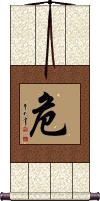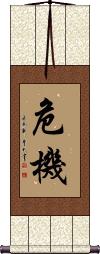Many custom options...
And formats...

Danger in Chinese / Japanese...
Buy a Danger calligraphy wall scroll here!
Personalize your custom “Danger” project by clicking the button next to your favorite “Danger” title below...
Danger
A dangerous character in every way
危 means danger, peril, or “to endanger” in Chinese, Japanese, and old Korean.
If you live a dangerous life or want to subtly warn others that you are a dangerous person, this may be the selection for you.
This also means “danger” and sometimes “fear” in Japanese and Korean but is seldom seen outside of compound words in those languages (as a single character, it's kind of like an abbreviation for danger in Japanese and Korean). 危 is also a rather odd selection for a wall scroll anyway. It's only here because people search for danger on our website.
Crisis equals Danger plus Opportunity?
危機 means crisis in Chinese and Japanese.
Separately, the first character here does mean “danger” or “to endanger,” and the second character can mean “opportunity.”
However, I want to debunk a myth that was propagated by some westerners who did not have a clear understanding of Asian languages...
While often, Chinese/Japanese/Korean compound words (words of two or more characters) are the sum of their parts, this is not always the case. The compound is often understood with a completely different meaning than the two characters individually.
Many have said that the Chinese/Japanese/Korean word for Crisis is made up of the characters for “danger” and “opportunity.” 危機 is true when phrased this way.
However, it's not absolutely correct to say that “danger + opportunity = crisis” in Asian cultures.
English example:
If I tell you that...
Bovine creature + Guy behind the plate in baseball = Locomotive train protection
![]()
...you would think I was mad. But consider that “cow + catcher = cowcatcher,” which is the device that used to be found on steam engines to protect them if they hit an animal on the tracks. When we hear the word “cowcatcher,” we don't separate the words into their individual meanings (necessarily).
The same is true with the word for crisis in Chinese/Japanese/Korean. While you can separate the characters, few Asian people would automatically do so in their minds.
The final answer:
It is a half-truth to say, “danger plus opportunity equals crisis” in Chinese/Japanese/Korean. Use this statement and concept with caution.
Also, the second character can mean “secret” or “machine,” depending on context so I guess you have to say “a dangerous machine = crisis” or “danger + a secret = crisis.” Both of these are only slightly more ridiculous than the first premise.
PS: 危機 is probably not a great word for a scroll unless you have a special use for it.
These search terms might be related to Danger:
Fate / Chance Meeting
Fate / Opportunity / Chance
Risk / Venture
Risk Taker
Serendipity / Chance Discovery
Not the results for Danger that you were looking for?
Below are some entries from our dictionary that may match your Danger search...
| Characters If shown, 2nd row is Simp. Chinese |
Pronunciation Romanization |
Simple Dictionary Definition |
危 see styles |
wēi wei1 wei ki き |
More info & calligraphy: Danger(1) danger; (2) {astron} (See 危宿,二十八宿,玄武・げんぶ・2) Chinese "rooftop" constellation (one of the 28 mansions) Perilous. |
冒険 see styles |
bouken / boken ぼうけん |
More info & calligraphy: Adventure |
急 see styles |
jí ji2 chi kyuu / kyu きゅう |
urgent; pressing; rapid; hurried; worried; to make (sb) anxious (adjectival noun) (1) sudden; abrupt; unexpected; (adjectival noun) (2) urgent; pressing; (adjectival noun) (3) steep; sharp; precipitous; (adjectival noun) (4) rapid; swift; fast; (5) emergency; crisis; danger; (6) urgency; hurrying; haste; (7) (See 序破急) (in gagaku or noh) end of a song Haste, urgency; promptly. |
患 see styles |
huàn huan4 huan gen |
to suffer (from illness); to contract (a disease); misfortune; trouble; danger; worry to suffer |
敵 敌 see styles |
dí di2 ti teki てき |
(bound form) enemy; (bound form) to be a match for; to rival; (bound form) to resist; to withstand (1) (ant: 味方・1) opponent; rival; adversary; (2) menace; danger; threat; enemy To oppose, compete; an enemy. |
蹩 see styles |
bié bie2 pieh |
to limp; to sprain (an ankle or wrist); to move carefully, as if evading a danger; to scurry |
險 险 see styles |
xiǎn xian3 hsien ken |
danger; dangerous; rugged misfortune |
難 难 see styles |
nàn nan4 nan nan なん |
disaster; distress; to scold (n,n-suf) (1) difficulty; trouble; hardship; shortage; (2) accident; disaster; danger; (3) fault; defect; flaw; (4) criticism; charge; blame Difficult, hard; distress, adversity; opposite of 易 easy; translit. nan, nam. |
KY see styles |
keewai; keiwai(sk) / keewai; kewai(sk) ケーワイ; ケイワイ(sk) |
(noun or adjectival noun) (1) (slang) (abbreviation) (from 空気 (kūki) and 読めない (yomenai)) (See 空気が読めない) unable to read the situation; unable to pick up on the mood (e.g. of a conversation); person who is unable to read the room; (2) (abbreviation) (from 危険 (kiken) and 予知 (yochi)) danger prevention (e.g. in the workplace) |
一難 see styles |
ichinan いちなん |
one difficulty; one danger |
傾危 倾危 see styles |
qīng wēi qing1 wei1 ch`ing wei ching wei |
in danger of collapse; in a parlous state; (of person) treacherous |
出險 出险 see styles |
chū xiǎn chu1 xian3 ch`u hsien chu hsien |
to get out of trouble; to escape from danger; a danger appears; threatened by danger |
勁草 劲草 see styles |
jìng cǎo jing4 cao3 ching ts`ao ching tsao keisou / keso けいそう |
tough upright grass; (fig.) a staunch character who is loyal despite danger and hardship wind-resistant blade of grass; resistant idea (metaphorically); (personal name) Keisou |
勤王 see styles |
qín wáng qin2 wang2 ch`in wang chin wang kinnou / kinno きんのう |
to serve the king diligently; to save the country in times of danger; to send troops to rescue the king loyalty to the emperor; loyalism |
危及 see styles |
wēi jí wei1 ji2 wei chi |
to endanger; to jeopardize; a danger (to life, national security etc) |
危害 see styles |
wēi hài wei1 hai4 wei hai kigai きがい |
to harm; to jeopardize; to endanger; harmful effect; damage; CL:個|个[ge4] injury; harm; danger endangering |
危急 see styles |
wēi jí wei1 ji2 wei chi kikyuu / kikyu ききゅう |
critical; desperate (situation) (1) emergency; crisis; imminent danger; (2) (obsolete) (See 絶滅危惧) Vulnerable (conservation status); VU |
危極 see styles |
kikyoku ききょく |
crisis; grave danger; serious depression |
危殆 see styles |
wēi dài wei1 dai4 wei tai kitai きたい |
grave danger; in jeopardy; in a critical condition danger; jeopardy; distress |
危気 see styles |
abunage あぶなげ |
(noun or adjectival noun) possibility of danger |
危疲 see styles |
wéi pí wei2 pi2 wei p`i wei pi kihi |
danger and tiredness |
危迫 see styles |
wēi pò wei1 po4 wei p`o wei po |
urgent; pressing danger |
危逼 see styles |
wēi bī wei1 bi1 wei pi kihiki |
grave danger |
危険 see styles |
kiken きけん |
(noun or adjectival noun) (1) (ant: 安全) danger; peril; hazard; (noun or adjectival noun) (2) risk |
危險 危险 see styles |
wēi xiǎn wei1 xian3 wei hsien |
danger; dangerous |
危難 危难 see styles |
wēi nàn wei1 nan4 wei nan kinan きなん |
calamity peril; danger; hazard; distress |
妊む see styles |
haramu はらむ |
(Godan verb with "mu" ending) (1) (kana only) to conceive; to become pregnant; (transitive verb) (2) (kana only) to get filled with (e.g. sails filled with wind); to be swollen with; (3) (kana only) to contain (e.g. contradiction or danger); (v5m,vi) (4) (kana only) to be swollen and ripe (of a plant ear, head, or sprout) |
孕む see styles |
haramu はらむ |
(Godan verb with "mu" ending) (1) (kana only) to conceive; to become pregnant; (transitive verb) (2) (kana only) to get filled with (e.g. sails filled with wind); to be swollen with; (3) (kana only) to contain (e.g. contradiction or danger); (v5m,vi) (4) (kana only) to be swollen and ripe (of a plant ear, head, or sprout) |
安危 see styles |
ān wēi an1 wei1 an wei anki あんき |
safety and danger; safety fate; safety; welfare security |
安厄 see styles |
ān è an1 e4 an o anyaku |
security and danger |
Click here for more Danger results from our dictionary
The following table may be helpful for those studying Chinese or Japanese...
| Title | Characters | Romaji (Romanized Japanese) | Various forms of Romanized Chinese | |
| Danger | 危 | ki | wēi / wei1 / wei | |
| Crisis equals Danger plus Opportunity? | 危機 危机 | kiki | wēi jī / wei1 ji1 / wei ji / weiji | wei chi / weichi |
| In some entries above you will see that characters have different versions above and below a line. In these cases, the characters above the line are Traditional Chinese, while the ones below are Simplified Chinese. | ||||
Successful Chinese Character and Japanese Kanji calligraphy searches within the last few hours...





